NYU president Linda Mills brought climate policy experts to the Silver Center for a Wednesday night panel focusing on how legislation and sustainable practices can help regulate nitrous oxide in the air.
The event, titled “Nitrous Oxide: Science and governance of a forgotten super pollutant,” featured three professors from NYU, Duke University and University of Maryland as keynote speakers, followed by a panel of experts from national environmental agencies and advising centers. At the start of the panel, Mills addressed attendees, providing an overview on the university’s sustainability initiatives and praising climate researchers from its business, law and medicine programs.
In her speech, Mills spoke on recent university operations designed to meet its goal of carbon neutrality by 2040, specifically noting the newly renovated Rubin Hall, solar panels at Bobst Library and plant-based options in dining halls. She also cited studies across NYU, including one about framing sustainability as “patriotic.”
“Our most vexing problems are solved by working across disciplines and pushing boundaries,” Mills said. “Few places cross borders like we do at NYU — tonight’s event is an outstanding example.”
According to speakers at the event, decades of research have found nitrous oxide to be damaging to the ozone layer, prompting discussion about how to form policies that counter its impact. They also presented findings from a new assessment of nitrous oxide and its impact and proposed methods to reduce current emissions, including a shift toward more plant-based diets and changing ingredients used in fertilizers.
David Kanter, an associate professor at NYU who helped organize the event, said he aimed to raise awareness about the threats nitrous oxide poses. Kanter said that because the majority of nitrous oxide usage is in synthetic fertilizers, economic reliance on agriculture has minimized legislation regulating the compound. He added that that carbon dioxide, while the primary focus for many policymakers, is only “half the problem.”
“If we only deal with that, there’s no way we’re gonna meet these ambitious climate goals that we’ve set for ourselves,” Kanter said in an interview with WSN. “The next obvious step is nitrous oxide.”
Emma Gonzalez, a Gallatin student studying environmental science with a focus in sustainability among fashion, consumption and urban studies, said the event helped her understand how concepts from her classes could translate to policies.
“I think it’s important that people do their research and listen to what scientists have to say,” Gonzalez said. “There is real data showing the effects of what’s happening.”
Contact Constantine Moore at [email protected].

























































































































































